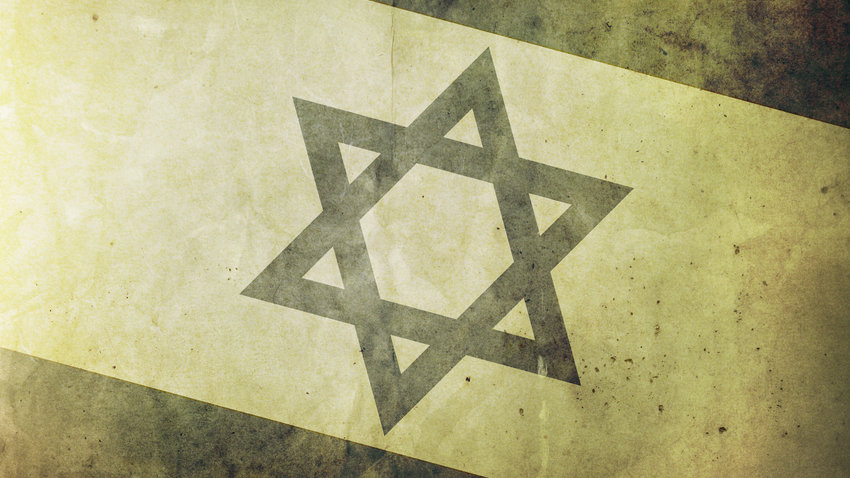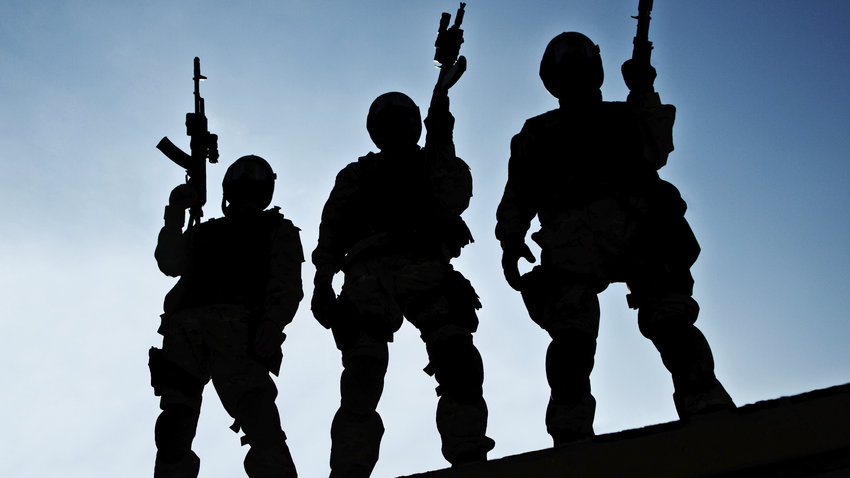Our Jewish friends and neighbors are celebrating Passover this week—from the sundown that welcomed Sabbath (April 4) to the sundown that concludes Sabbath (April 11). Included in their festivities will be the solemn but joyous celebration of the Seder. Replete with candles, the unleavened matzah bread, the maror bitter herbs, and a sumptuous dinner, this annual ritual Seder gathering of family and friends around the supper table is unlike any other Jewish celebration. And of course it is for them a powerful, emotive reminder of God’s epic midnight deliverance of the children of Israel from Egypt long ago. The Passover Seder’s fifteen steps—from the opening Kadesh to the concluding Hallel and Nirtzah—not only serve as a symbolic union with the ancient faith community, but also as a collective expression of hope that God will even yet bring ultimate deliverance for His children scattered across the earth. As one Seder website testifies: “We recognize that despite our freedom we still live in a fractured world where things are less than perfect. We hope, dream and sing of a world redeemed as we conclude this year’s Seder, and commit ourselves to being part of this unfolding narrative” (http://www.aish.com/h/pes/t/si/The-Passover-Seders-15-Steps.html?s=show&tab=y). I like that—“We hope, dream and sing of a world redeemed . . . and commit ourselves to being part of this unfolding narrative.” Don’t we all—Jews, Christians, Seventh-day Adventists alike? “For whenever you eat this bread and drink this cup, you proclaim the Lord’s death until he comes” (1 Corinthians 11:26). So wrote the rabbi and apostle Paul. But I’m not thinking of the ritual meal (whether it is the Seder or the Lord’s Supper). I wonder instead about the hope that the meal is intended to nourish, the hope of the yet-to-come Exodus deliverance of the people of God at the Second Coming of Christ. How vibrant is that adventist hope these days? The hotly contested nuclear accord with Iran, the Islamic State meltdown in the heart of the Middle East may distract us from the chronic entropy with which the rest of the planet struggles—the leakage of economies large and small, a crumbling of moral foundations, the demise of genuine social progress or even spiritual hope. The hype of our entertainment and sports frenzy notwithstanding, there is a collective, almost palpable longing for some Moses figure to rise up and shepherd this broken civilization toward healing. From my humble perspective we really can get there from here, without a multiplication of complex moves. In fact just a short step lies between here and there. But before we get there, there is this promise: “‘ . . . and I will bring judgment on all the gods of Egypt. I am the LORD. The blood will be a sign for you on the houses where you are; and when I see the blood, I will pass over you’” (Exodus 12:12-13). In the final Exodus, those who are passed over (i.e., delivered by the Almighty) are those who take refuge “under the blood,” the scarlet sign of the Lamb of God. That the Pharaoh’s of earth will refuse the blood is obvious. But not all citizens will share that rejection. The Exodus narrative declares, “Many other people [Egyptians] went up with them [the children of Israel]” (Exodus 12:38). In that midnight neighbors, acquaintances, even strangers turned to the God of the Israelites, seeking refuge with them “under the blood,” thus inheriting with them the promise of the Promised Land. Evangelism isn’t an obsolete program of the church. As in the Exodus, it is the opening of our homes and hearts to millions who will yet find in Christ the only Deliverer from a disintegrating world. And the good news is they live next door.
Pastors' Blog
By Pioneer Pastors

The Wall Street Journal this week reported the story of Sandra Ladra of Prague, Oklahoma. She was sitting in a recliner at home when the earthquake struck. As she describes it, the ground shook, her chandeliers “swung wildly” and the stone chimney in her house disintegrated, sending blocks through her roof and onto her legs. “‘I was screaming. I was trying to keep the blocks from hitting me’ said Ms. Ladra, 64 years old. Her home suffered more than $100,000 in damages, and a doctor says she needs surgery, she said.” Turns out it was a 5.6-magnitude quake, the strongest ever recorded in Oklahoma. (http://www.wsj.com/articles/frackings-new-legal-threat-earthquake-suits-1427736148) But it also turns out that officials of the Oklahoma Geological Society first suggested that the earthquake was the result of nearby oil and gas drilling, but later rescinded that decision and declared that quake to be from natural causes. Ms. Ladra isn’t buying their change of opinion. Her suit links her injuries and damage to fracking, an oil or gas drilling procedure “which involves shooting a slurry of water, sand and chemicals into wells to let oil and gas flow out.” Although in fact researchers now suggest that “the most serious seismic risk comes from a separate process: disposal of toxic fluids left over from fracking and drilling by putting it in wells deep underground. Geologists concluded decades ago that injecting fluid into a geologic fault can lubricate giant slabs of rock, causing them to slip. Scientists say disposal wells are sometimes bored into unmapped faults. The practice isn't new, but has proliferated with the U.S. drilling boom.” (Ibid) So Sandra Ladra is suing the giant energy conglomerates for the earthquake that caused her injuries. Given the global extent of fracking and drilling, you can understand the keen interest with which the oil and gas industry is watching this court battle. So who gets sued for the explosive earthquake that shook Jerusalem early Easter Sunday? “There was a violent earthquake, for an angel of the Lord came down from heaven and, going to the tomb, rolled back the stone and sat on it” (Mt 28:2). Have you noticed? An earthquake when He died, an earthquake when He arose, and an earthquake when He returns—you get the impression that Christ is the Lord of unbridled power, don’t you? Truth is, His enemies could have piled a thousand Mt Everests on top of His garden tomb—but it would have made no difference! Not even death could pin Him to the sepulcher. But maybe what has you pinned under the rubble right now isn’t death. Perhaps it’s debt . . . divorce . . . despair . . . or debilitating illness, fear, failure or loneliness. God knows all the enemy crumbles on top of us. Which is why—not only on Easter but for every day and night still ahead of us—we need to keep hearing that mighty cry when Jesus came striding out of that quake-shattered crypt and declared over the pre-dawn rubble, “I am the resurrection and the life!” It was indisputable then—it is so now. Death and even life may bury us—but in the power of the risen Savior we can still be resurrected. Sue Him? Never. Worship Him forever and ever. Amen.

Maybe it’s because I just returned from a week-long preaching mission (nine sermons) in Serbia—that land torn by the pincers of war through much of its recent history. Or perhaps it was this week’s reporting on the 70th anniversary of the Battle for Iwo Jima, the site of one of World War 2’s bloodiest onslaughts and the setting for the iconic picture of U.S. Marines hoisting their wind-whipped American flag atop Mt Suribachi. Whatever the reason, I must confess that in reading the opening line to Daniel 10 today, the phrase “a great war” instantly caught my attention and triggered a brooding chain of thoughts. Can you think of a more accurate defining of our times than “a great war”? It’s what we do for a living (and dying) any more on this planet! I get headline text alerts from CNN on my phone, and almost daily come soundbite reports of another mosque or church or school or marketplace or museum suicide bombing somewhere on earth (though usually from the warring heart of the Middle East). Yemen, Tunisia, Pakistan, Afghanistan, Syria, Iraq, Israel—the roll-call of terrorized nations is too lengthy to enumerate. Sydney, Paris, London—even in the West we know the war of terror. “A revelation was given to Daniel—its message was true and it concerned a great war” (Daniel 10:1). The eighty year old exile, prime minister and prophet was so troubled by recent events in his world that he devoted 21 days to modified fasting and concentrated praying. And at the end of three weeks, that aged one, called by Heaven “greatly beloved,” experienced a stunning personal visitation by the pre-incarnate Christ and His trusted angel messenger Gabriel. And from the conversation that ensues (albeit dominantly one- and God-sided), the veil between us and the unseen world lifts briefly—and we gaze upon beings, celestial armies, forces of light and darkness desperately locked in battle for human allegiance. Daniel, burdened for the salvation of his people, is shown “a great war” in the highest echelons of humanity—a spiritual battle directed by the Almighty Himself to preserve a people, a movement targeted by the dark enemy for annihilation. Will evil triumph over righteousness, will the community of faith be decimated by him who seeks only our destruction? Live on this campus, live in the world, and it is more than evident the maelstrom of this “great war” surrounds us, too. Forces we know very little about have marked for eradication the spiritual values we embrace. Cloaked behind innocuous symbols like cupcakes and lollipops, it is marketing ploy as old as Eden—insinuations of doubt, whisperings of falsehoods, and the unsubtle targeting of innocents who struggle to understand the values and morality of Christ against the crescendoing drumbeat of a culture that tolerates no contrarian values and brooks no courageous opposition. “A great war” indeed—and Daniel and you and me. And the forces. Where shall we stand? I like the way my friend, Dr Skip MacCarty, has defined his stance, and I’d like you to read it prayerfully, too (though it may be a bit more explicit than you’re used to). But because his point is so logically, compassionately and persuasively made, I believe it deserves a very far and wide hearing. So please—read it, post it and retweet it (https://www.facebook.com/skip.maccarty/posts/10153167969416419). Why not take a stand in this “great war,” even as he has done? After all, “Dare to Be a Daniel” has got to be more than a childhood song. It’s the one stance you’ll be able to live with for eternity. And isn’t eternity the highest stake of all in this “great war”?

I guess we shouldn’t have been surprised that last Sabbath afternoon’s panel/audience conversation about race relations in the Seventh-day Adventist church in America was a standing-room only event (here at Andrews University). The conversation was candid, but the spirit that prevailed was both healthy and essential to any future change in our national church. What I’m especially proud of, however, is the prayerful, cogent thinking evidenced by the team of Andrews University student leaders who organized the event. Led by Livvy Knott-Ruiz, AU Student Association president this year, this diverse band of young leaders not only effectively facilitated the 2+ hour conversation, they ended the event by sharing with the audience a formal statement they prepared for (and have subsequently delivered to) the administration of the North American Division of Seventh-day Adventists. As a panel member, I had no idea the young leaders had prepared a resolution. But as I read their statement, projected onto the towering wall of Buller Hall, my heart rejoiced in the simple, humble but wise appeal they make. Rather than insert their recommendation to the NAD officers here, please find it at this link (https://www.facebook.com/andrewssa/posts/791148580953919) and carefully, prayerfully read their statement. You may share their recommendation by placing this link on your own Facebook page or retweet the link on Twitter. I’m sure their youthful appeal will be heard not only across this nation, but around the world. And why not? Surely in the economy of God the time has come for Jesus’ last prayer (expressed four times) to be answered: “That they may be one, Father, as We are one” (count those four prayers in John 17). I continue to believe that the young are God’s strategic endtime key (see Psalm 110). With social media as their platform, they are able to effect change on levels we have not seen in the past. But it is clear their interest is not change, simply for the sake of change. Rather, belonging to a world and nation deeply in need of the gospel of justice, equality and compassionate humanitarian intervention, the young of the church are willing to bend their minds, their energies and immerse their lives in seeking to bring healing change to both the church and the world. To that end the young need our prayers, deserve our example, and will flourish with our personal support and encouragement. Thank you for the way you affirm the young disciples of Jesus in your life and community, for your willingness to journey alongside of them in this critical chapter of earth history.

The flap this week over Israel’s prime minister, Benjamin Netanyahu (whom I bumped into once in a department store in Helsinki, Finland—albeit at a secure distance), addressing the U.S. Congress without the invitation or approval of President Obama is no doubt more about personal chemistry than political protocol. But it certainly has raised among the chattering class the question of this nation’s historic ties to Israel. A decade ago Left Behind, the bestselling fictional series by Tim LaHaye and Jerry Jenkins, popularized the evangelical notion that modern Israel is prophetically destined to be a critical player in God’s endgame for this civilization. LaHaye, himself a minister, built his case (as numerous evangelical scholars have done) on the premise that God’s ancient predictions regarding Israel (in Isaiah, Jeremiah and the Old Testament prophets) were intended to remain literal prophecies to be fulfilled through the nation of Israel today. Thus LaHaye announced the hand of God in the formation of the state of Israel (1948), the recapture of Jerusalem, and an eventual rebuilding of the Jerusalem temple and conversion of Jews in Israel at the time of Christ’s return. This evangelical interpretation of Old Testament prophecy strongly undergirds the political support Israel enjoys particularly among Republicans. As Seventh-day Adventists we reject the interpretation that divine prophecies, including those concerning Israel in the Old Testament, must have an eventual literal fulfillment in earth history. Rather we embrace the Bible teaching of conditional prophecy, as God explained it: “‘If at any time I announce that a nation or kingdom is to be uprooted, torn down and destroyed, and if that nation I warned repents of its evil, then I will relent and not inflict on it the disaster I had planned. And if at another time I announce that a nation or kingdom is to be built up and planted, and if it does evil in my sight and does not obey me, then I will reconsider the good I had intended to do for it’” (Jeremiah 18:9, 10). God clearly states that divine blessings upon a people or a nation are contingent upon their response to God. I.e., their destiny is linked to their obedience or disobedience of the principles of God’s Kingdom. Thus we believe that when the leaders of the Jewish nation rejected the repeated overtures of the incarnate God in Christ to return to Him and instead collectively refused to accept the Messiah and manifested their choice through the crucifixion of Jesus and subsequent stoning of Stephen, God radically shifted His mission to reach the world. His strategic base would no longer be the literal nation of Israel, but rather a new spiritual nation no longer bound by borders or genetics—the Christian church, the new “Israel of God” (Galatians 6:16). As Paul wrote:“If you belong to Christ, then you are Abraham’s seed [children of Israel], and heirs according to the promise” (Galatians 3:29). Thus today the U.S. alliance with Israel is not prophetic but rather military and political. For it is the church of Christ, the new and spiritual Israel, that has inherited the prophecies regarding that ancient nation. And as the community of the redeemed, the new Israel is described in prophecy as “a great number that no one could count, from every nation, tribe, people and language” (Revelation 7:9). However—and this is a vital “however”—the Jewish people are still very much beloved by God. Through the millennia they have been the keepers of “the oracles of God” (Romans 3:2). The masses in the time of Jesus joyfully accepted Him (Matthew21:46). Thus the passion of the New Testament is “that they may be saved” (Romans 10:1). Note this prediction made a century ago: “There will be many converted from among the Jews, and these converts will aid in preparing the way of the Lord, and making straight in the desert a highway for our God. Converted Jews are to have an important part to act in the great preparations to be made in the future to receive Christ, our Prince” (Evangelism 579). God very much still has a heart for the children of Israel! And if He does, shouldn’t we also?

That’s the headline of a Wall Street Journal piece last weekend, reporting the startling demise of the family as we know it, not only here in the United States but in Europe and Asia as well. “All around the world today, pre-existing family patterns are being upended by a revolutionary new force: the seemingly unstoppable quest for convenience by adults demanding ever-greater autonomy. . . . Thanks to this revolution, it is perhaps easier than ever before to free oneself from the burdens that would otherwise be imposed by spouses, children, relatives or significant others with whom one shares a hearth” (WSJ February 21-22, 2015, A11). Consider these statistics: • As of 2013 according to the Centers for Disease Control “40% of babies in the U.S. were born outside of marriage.” • The Census Bureau for 2014 estimates that “27% of all children (and 22% of ‘White’ children) lived in a fatherless home.” • A 2011 study reported “just 59% of all American children (and 65% of ‘Anglo’ or non-Hispanic white children) lived with married and biological parents as of 2009.” • In Europe “the probability of marriage before age 50 has been plummeting for European women and men, while the chance for divorce for those who do marry has been soaring.” • In Belgium “the likelihood of a first marriage for a woman of reproductive age is now down to 40%, and the likelihood of divorce is over 50%. This means that in Belgium the odds of getting married and staying married are under one in five.” • In Europe “the proportion of childless 40-something women is one in five for Sweden and Switzerland, and one in four in Italy. In Berlin and in the German city-state of Hamburg, it’s nearly one in three.” • “In Western Europe, nearly one home in three (32%) is already a one-person unit, while in autonomy-prizing Denmark the number exceeds 45%.” • In Japan “about one-sixth of Japanese women in their mid-40s are still single, and about 30% of all women that age are childless. Twenty years hence 38% of all Japanese women in their mid-40s would be childless, and an even higher share—just over 50%—would never have grandchildren.” • South Korea, Singapore, Hong Kong—the statistics mirror those above. • Even in less affluent Muslim-majority societies “a flight from marriage within the Arab world is in process,” indicating “high levels of income and educational attainment are not preconditions for the new family revolution in those spots on the globe it hasn’t reached.” And who will suffer the most in this social revolution? Our children and our aged. The WSJ report concludes: “Our world-wide flight from family constitutes a significant international victory for self-actualization over sacrifice, and might even be said to mark a new chapter in humanity’s conscious pursuit of happiness. But . . . it is far from clear that humanity is prepared to cope with the consequences of its impending family deficit, with [its] increasing independence [from] those traditionally most dependent on others—i.e., the young and the old” (emphasis supplied). A global shift from sacrificing for the sake of others to caring only for one’s self. Must it come to this? The Old Testament ends with this provocative prophecy: “‘See, I will send the prophet Elijah to you before that great and dreadful day of the LORD comes. He will turn the hearts of the parents to their children, and the hearts of the children to their parents’” (Malachi 4:5-6). This prediction of a global movement to repair and restore the family clearly presupposes endtime forces bent on destroying the divine edenic ideal of the nuclear family. The statistics are sobering, but God speaks a “last word” into the crisis. Could you and I become part of that restorative “last word?” Could we by our compassion and proactive care for the young and aged be instrumental in God’s effort to save not only the most vulnerable, but to save the family itself? Clearly, we can’t just sit here and do nothing, can we? So what shall we do?

How many more videoed ISIS murders will the world tolerate? It isn’t a pleasant conversation to have; but the tragic brutality notwithstanding, one can’t help but wonder how horrific the scenes must become before there is a global, collective rising up of the human race to halt the butchery. The extermination of six million Jews during World War 2 began with a handful of murders here, another box-car-full there—but all of it (at least initially) beyond the eye and knowledge of an unsuspecting world. Not so the ISIS brutalities that are carefully, even professionally choreographed so all can witness (albeit after the fact) their bloody reprisals. Twenty-one Egyptian Coptic Christians, purportedly lined up for a mass beheading last week. Forty-five Iraqis reported burned to death in cages this week not unlike the hapless Jordanian air force pilot. And all of it at the hands of a taunting organization of terrorists. I am not advocating a “nuke them all” military strategy to end the cruel mayhem. The sword rarely halts the sword. But with every new ISIS headline, the conviction deepens that some sinister mind is cruelly dragging this race into a raging cauldron—for purposes perhaps not yet entirely clear to us. Will a popular moral leader finally speak up and unite the world in a crusade to obliterate such moral debauchery? But as long as all of this is “over there,” how could any leader, political or moral, effectively mobilize the world community? Must it come “over here” first? What lies ahead for us all? Jesus prophesied a “final sign” of His return: Throughout history His followers have been motivated to seek the fulfillment of this last sign, ostensibly to hasten the return of their Lord. But the ratcheting up of human misery and suffering across the earth is surely fresh impetus to obey Christ’s command. What else but the light of His Gospel could possibly penetrate the moral darkness and heal the crippling pain of hopelessness that far, far too many suffer today? Not only in the Middle East, but in the West as well. “. . . from every quarter of this world of ours comes the cry of sin-stricken hearts for a knowledge of the God of love. Millions upon millions have never so much as heard of God or of His love revealed in Christ. It is their right to receive this knowledge. They have an equal claim with us in the Saviour’s mercy” (Education 262-263). “An equal claim” on Jesus’ mercy—black-robed ISIS executioners are not immune to Calvary’s piercing love, are they? Neither are the sobbing loved ones whose wails rend the air. All have “an equal claim” on the Savior’s mercy. And so to all He sends us. For that reason “Kingdom Growth” is fresh language at Pioneer to express this university congregation’s unrelenting commitment to go into all the world, to send into all the world, to give into all the world. “An equal claim” on the Savior’s mercy. Kingdom Growth. Growing Christ’s kingdom one saved life at a time. Like the pioneers. 2015 and beyond.

OK—so he’s from Battle Creek instead of Benton Harbor. But he certainly is a hero down here in southwest Michigan! The two families, who were both celebrating birthdays this last weekend at the Silver Beach hotel down by the lake in St Joseph, didn’t know each other from Adam. But given the winter outside, the hotel’s heated pool was a popular hang out Saturday evening. That’s when something caught the attention of 29 year old Tim Rose. Sitting poolside with his family and friends, he had observed a 10 year old boy from another family party darting like a fish under water, doing fine. Tim turned his attention back to his own birthday party. But a few moments later, happening to glance at the pool again, he saw the same boy rise to the surface and then for some reason sink back down again, this time all the way to the bottom of the eight-foot-deep section. A few air bubbles escaped from the boy’s mouth, and Tim realized the boy was no longer moving. He reacted instantly, plunging into the pool, diving down to the bottom to grab the boy and bring him to the surface. He yelled for help, as bystanders rushed to pull the boy from the water and laid him on the concrete edge of the pool. Tim, who learned CPR a few years ago, immediately began mouth to mouth resuscitation alternating with chest compressions. Somebody called 911. Two minutes into his rescue efforts, Tim rolled the boy’s head to the side and seconds later the boy coughed up some water, and showed signs of coming to. Paramedics arrived and rushed the now conscious lad to Lakeland Hospital. The boy’s life had been saved. The next morning the 29 year old tree trimmer ran into a family member of 10 year old Melvin Jackson, of Benton Harbor. “Wait right here,” she instructed the life saver. A few moments later she brought young Melvin to meet his savior. “He gave me a hug and told me I was his angel,” Tim told a reporter. “It was a serious moment in my life. It seemed like forever. I was just hoping for a response and when I finally got that it was definitely a relief” (South Bend Tribune 1-28-15). “It was a serious moment in my life.” Let’s face it—it always is when a life is on the line, isn’t it? That’s why I hope you’ll give prayerful consideration to joining the new Contagious Adventist GROW Group this new season. Offered at three different times to accommodate your schedule, this new GROW Group will equip you with a winsome and friendly strategy to share your faith with friends, colleagues and neighbors (even strangers). You’ll never look at the seven greatest truths of Scripture in the same way again—and now you’ll “always be prepared to give an answer to everyone who asks you to give the reason for the hope that you have” (1 Peter 3:15 NIV). Because there is no greater joy than saving a life. Just ask Tim Rose. And Melvin Jackson.

One writer has observed that of all the chapters in Scripture, John 17 is “the easiest in regard to words, the most profound in regard to ideas” (SDA BC 5:1051). The entire chapter is a prayer, the longest prayer of Jesus on record. He will be dead in less than twenty-four hours. But thinking little of Himself, the Savior pleads with God on behalf of His disciples: “‘I have given them the glory that You gave Me, that they may be one as we are one—I in them and You in Me—so that they may be brought to complete unity’” (John17:22, 23 NIV, emphasis supplied). Any idea of what “complete unity” would look like in the third millennial church? It surely can’t mean that we would all think alike. A quick perusal of the Book of Acts makes it abundantly clear that to “let this mind be in you which was also in Christ Jesus” (Philippians 2:5 NKJV) provides wide latitude for individual conviction and expression based on personal experience and spiritual giftedness. “Complete unity” can’t mean that we would all act alike either. The striking differences between the modus operandi of John vs Peter vs Paul vs Mary vs Timothy vs James, et al, is evidence enough that the Holy Spirit is the eager sponsor of “diversities of gifts” and “differences of ministries” and “diversities of activities” (1 Corinthians 12:4-6). So how would Jesus’ prayer for “complete unity” among His followers be answered today? Whatever the answer, Jesus is unequivocal regarding the impression such unity makes on the world: “Then the world will know that You sent Me and have loved them even as You have loved Me” (v 24). His point? “Complete unity” within the community of faith provides compelling evidence that (1) Christ is the Sent One of God, and (2) the church is the sent one of Christ—“‘By this all will know that you are My disciples, if you have love for one another’” (John 13:35). “Complete unity” lived out through our radical, counter-cultural love for one another—how can the church have a more persuasive and contagious witness to the Savior than that! That’s why I shared with you last Sabbath my heart burden for this community of faith to reflect the strong love of racial unity as well. In this congregation, on this campus, and throughout the church in America Jesus’ prayer (which is an implicit promise) for “complete unity” must be answered. But rather than waiting for “them” to reflect it, you and I need to daily act on Christ’s calling for us to be a bridge, a catalyst, a change agent, a genuine unselfish friend to all, irrespective of color or character. Yes, people can petition for change, and communities can struggle to incarnate change within their own traditions, and leaders and denominations can wrestle through the sometimes extremely difficult task of organizational change for the sake of “complete unity.” But God’s Kingdom advances most convincingly through personal almost private acts of unscripted love, sacrificial love. Writing of such unscripted love, Sam Walter Foss makes the invitation well:
Let me live in my house by the side of the road— It’s here the race of men go by. They are good, they are bad, they are weak, they are strong, Wise, foolish—so am I; Then why should I sit in the scorner’s seat, Or hurl the cynic’s band? Let me live in my house by the side of the road And be a friend to man.

I don’t want to sound like the Apostle Paul, who couldn’t resist reminding his shipmates, “I told you so!” (see Acts 27:21). But last Sabbath in “Why I Believe We’re Running Out of Time,” we wondered together whether bloody terrorist attacks like the one in Paris can be the catalyst for setting our civilization up for strong, coercive, authoritarian control of the masses—as both Daniel 12 and Revelation 13 portend will happen just before the return of Christ. Clearly the only way a free society can prevent these random acts of bloody mayhem is if governments increase both security and surveillance. That’s common sense. However—and this is a huge “however”—increasing security and surveillance necessitates a concomitant abrogation or reduction of civil and personal liberties, the very values cherished in democratic societies (which explains last year’s hue and cry over Edward Snowden’s disclosures of the government’s secret tapping of cell phones and emails). But have you noticed—in a crisis such as France is facing, public outcry strangely diminishes. Why? Because the need for security/safety trumps the desire for freedom and privacy. Last Sabbath we noted that two days after the September 11 terrorist attacks in this nation 52% of Americans said they were willing to give up some civil liberties for the sake of national security. In the heat and fear of a crisis, people are willing to abandon long-held values, all for the sake of their safety. So who was surprised this week when the French Prime Minister “demanded tougher anti-terrorism measures Tuesday after deadly attacks that some call [France’s] Sept. 11—and that may already be leading to a crackdown on liberties in exchange for greater security” (South Bend Tribune 1-14-15 emphasis supplied). Precisely the point we made last Sabbath—crises have always been the catalyst for a radical redefining of what our essential liberties really are. Even religious liberties. Daniel and Revelation describe a global crisis-induced coercive authoritarianism that will one day command the masses to worship a church-state amalgamation (the same confederacy that reigned in terror during the Dark Ages)—all for the sake of collective security/safety. I repeat—all it will take to start the cascade of apocalyptic dominos is a massive crisis, national or global or both. And for the sake of security/safety (ostensibly for the preservation of “law and order”), even religion practice will eventually be dictated. So declares the Word of God. The point? The divine endgame is just a crisis away. So shouldn’t we be asking God for help now? Before the crises strike much closer to home? The church in Acts is a profound example of “united prayer” in the face of crisis. Prayers for divine deliverance, prayers for protection from government incursion, prayers for the salvation of the masses while the doors are still open, prayers for the coming of the Kingdom of Christ—surely it is time for us to be praying those same prayers together. “[Jesus’ promise in Matthew 18:19, 20—mark it in your Bible] is made on condition that the united prayers of the church are offered, and in answer to these prayers there may be expected a power greater than that which comes in answer to private prayer” (Manuscript Releases 9:303 emphasis supplied). An even greater power is unleashed when we pray together! So why not join a GROW Group and pray in a circle of new friends? Or form a band of your old friends. The key is praying together. If ever we needed “a power greater,” wouldn’t it be now?
- ‹ previous
- 30 of 62
- next ›
